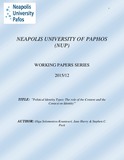| dc.contributor.author | Solomontos-Kountouri, Olga | |
| dc.contributor.author | Hurry, Jane | |
| dc.contributor.author | Peck, Stephen C. | |
| dc.date.accessioned | 2016-01-21T11:39:58Z | |
| dc.date.available | 2016-01-21T11:39:58Z | |
| dc.date.issued | 2015-12 | |
| dc.identifier.uri | http://hdl.handle.net/11728/7096 | |
| dc.description.abstract | Political identity content of Greek Cypriot adolescents in terms of values, beliefs and attitudes was explored using an inductive method to elicit data. The macro-context of Greek Cypriot society was chosen specifically, because the national issue of a partition makes political identity particularly salient. Adolescents (449 males and 589 females) were asked to write three answers to the question "Who are you in terms of your political beliefs?" The variables elicited from the open-ended question were cluster analyzed by the use of a person-center-approach to identify nine political identity types. These types were closely related to the specific macro-context of Cyprus. This approach provided an extension and critical reconsideration of the four-identity statuses paradigm. Results indicate a set of political values, beliefs and attitudes that are significant indicators for healthy political engagement, reflecting the macro-context and related to gender, type of school and socio-economic status. | en_UK |
| dc.language.iso | en | en_UK |
| dc.rights.uri | http://creativecommons.org/licenses/by-nc-nd/4.0/ | en_UK |
| dc.subject | political-identity-content | en_UK |
| dc.subject | macro-context | en_UK |
| dc.subject | SES | en_UK |
| dc.subject | type of school | en_UK |
| dc.subject | gender | en_UK |
| dc.subject | person-center approach | en_UK |
| dc.title | Political Identity Types: The role of the Content and the Context on Identity | en_UK |
| dc.type | Working Paper | en_UK |


